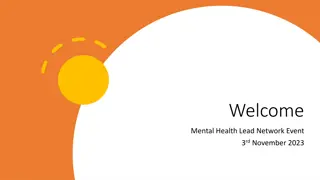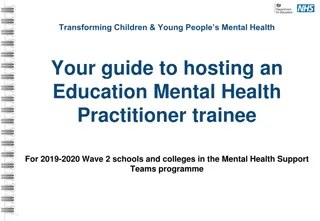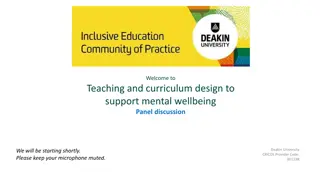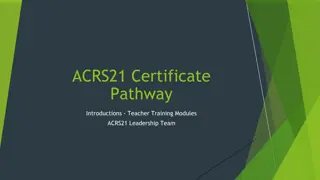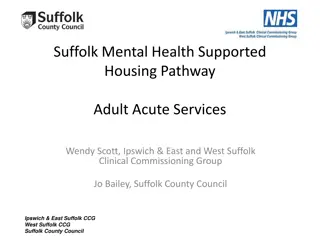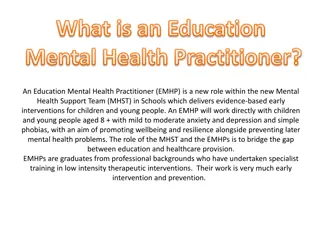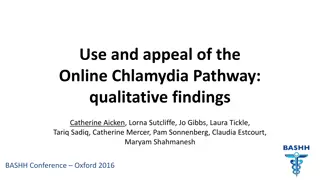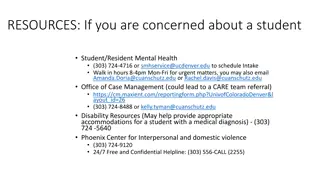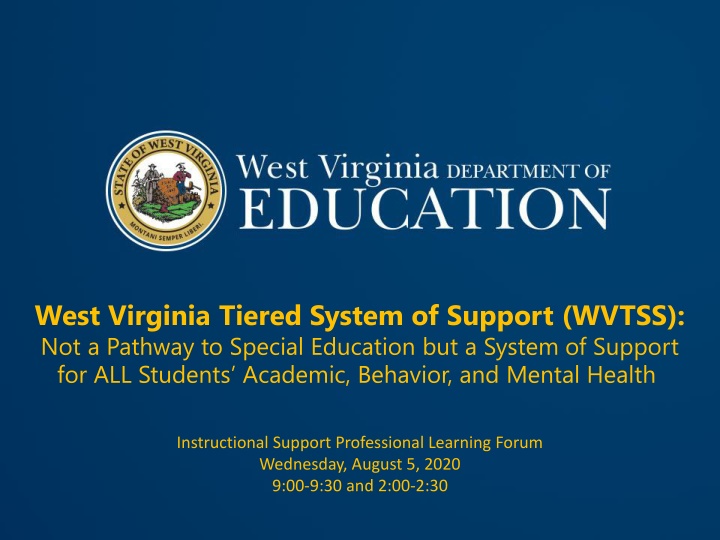
West Virginia's Tiered System of Support (WVTSS)
Explore West Virginia's Tiered System of Support (WVTSS), a comprehensive framework focusing on academic, behavioral, and mental health support for all students. Learn about the various tiers, implications for special education, and strategies for enhancing parent involvement and professional learning.
Download Presentation

Please find below an Image/Link to download the presentation.
The content on the website is provided AS IS for your information and personal use only. It may not be sold, licensed, or shared on other websites without obtaining consent from the author. If you encounter any issues during the download, it is possible that the publisher has removed the file from their server.
You are allowed to download the files provided on this website for personal or commercial use, subject to the condition that they are used lawfully. All files are the property of their respective owners.
The content on the website is provided AS IS for your information and personal use only. It may not be sold, licensed, or shared on other websites without obtaining consent from the author.
E N D
Presentation Transcript
West Virginia Tiered System of Support (WVTSS): Not a Pathway to Special Education but a System of Support for ALL Students Academic, Behavior, and Mental Health Instructional Support Professional Learning Forum Wednesday, August 5, 2020 9:00-9:30 and 2:00-2:30
Ho usekeep i ng P ro c edures Please note that this session will be recorded and shared. Please mute your microphone unless you are speaking. Please keep your camera off during the presentation to preserve bandwidth. Check the volume on your speakers before we begin. Closed captioning is available by hitting the on your horizontal on- screen menu. To open your chat box, click on the speech bubble button on your horizontal on-screen menu. It should open to the right of your screen. A PDF of the presentation slides will be shared in the chat box at the end. If you are having any problems with the items above, please describe your problem in the chat box before we begin so that I can try to assist you. 2
Bef o re we b egi n When returning to school, relationships, social/emotional well-being and physical health of our students and staff is our number one priority along with learning. Using a variety of tool to communicate with students and families will be key in making re-entry successful. Students will be at different places emotionally and academically. Educators should use available tools to determine where students are and identify their needs. Educators should use personal and professional observations, conversations, informal assessments, formative assessments, interim and diagnostics assessments to determine what support students need. Schools should use vertical teaming with teaching staff to identify gaps in the prerequisite skills needed for students to be successful academically. In this forum, you will see a variety of sessions that will assist you with in- person, remote and blended learning strategies and best practices. 3
Sessi o n Ob j ec ti ves WVTSS Overview (Academics, Behavior, Mental Health) WVTSS Tiers (Universal, Targeted, Intensive) Special Education Implications Parent Involvement Professional Learning Next Steps 4
Ac a dem i c Sup p o rt Universal- All students received instruction and demonstrate learning of the WV College and Career-Readiness Standards. Targeted- Eliminate gap between present achievement and grade- level standards and between instruction and students needs. Intensive- Eliminate or narrow gap between present achievement and grade-level standards and between instruction and students needs. 6
Beha vi o ra l Sup p o rt Universal- Policy 2520.19, West Virginia College- and Career- Readiness Dispositions and Standards for Student Success for Grades K-12 are integrated into daily classroom expectations and instruction. Effective school-wide behavior supports are provided. Targeted- Specialized, targeted positive behavior supports are provided. Intensive- Specialized and intensified positive behavior supports are provided. May include an assessment of student behaviors; Functional Behavior Assessment (FBA), and the development of specialized Behavior Intervention Plans (BIP). 7
M enta l Hea l th Sup p o rt Universal- Mental health support refers to all activities that foster positive social, emotional and behavioral skills and well-being of all students, regardless of whether they are at risk for mental health problems. The West Virginia College- and Career-Readiness Dispositions and Standards for Student Success for Grades K-12 and social- emotional Learning/SEL (teaching students to manage emotions, set and achieve positive goals, feel and show empathy, maintain positive relationships, make responsible decisions, etc.) are integrated into daily classroom expectations and instruction. Positive school climate is regularly monitored and assessed. 8
M enta l Hea l th Sup p o rt Targeted servicesand/or strategies are designed to address mental health concerns for students who have been identified through a systematic, equitable process as experiencing mild distress or being at-risk for a given condition or concern. Targeted supports may also be used for students to address targeted needs, low-intensity classroom supports such as check- in/check-out, increased instruction with self-regulation and social skills are emphasized and provided to small groups of students. Outside mental health professionals may provide services within the school setting (Expanded School Mental Health, School-Based Health Centers). 9
M enta l Hea l th Sup p o rts Intensive services and support interventions are designed to address mental health concerns for students who have not been successful with targeted interventions or who are already experiencing significant distress and impaired functioning. Specialized and intensified mental health support which may include group, individual, or family therapy and/or wrap-around services for identified students. Continuous collaboration with the school supports individual student needs. Outside mental health professionals may provide services within the school setting (Expanded School Mental Health, School-Based Health Centers). 10
U ni versa l Group Size Whole group and small group instruction. Flexible, fluid grouping allows students to move between groups as appropriate. Time Provide sufficient time to master required content and expected behaviors. Assessments Screening-Beginning of school year for all students and/or as needs indicate. Interim-Middle and end of school year for all students and/or as needs indicate. Formative-Ongoing progress for all students. Personnel General education classroom teacher with support from other building staff to reinforce learning Location General education classroom 11
Ta rgeted Group Size Small, flexible, fluid groups of students with similar skills and needs. Time Time allotted is data-driven and based on individual student progress. Suggestions for academics include 15-30-minute sessions, three to five times a week in addition to Universal, for 9 weeks. Suggestions for behavior and mental health is determined by student need, and in addition to Universal supports. Assessments and Progress Monitoring Continuous use of FormativeClassroomAssessmentprocesses and ProgressMonitoringto measure and compare student learning and to adjust instruction and support. Suggestions for frequency include every 2-3 weeks. Diagnostic-when more information is needed for program planning. Personnel General education classroom teacher or specialist (e.g. Title I, Special Educator) or other staff to reinforce learning. Location Small group in general education classroom or another appropriate setting within school; before, during or after school, and summer, or interim session. 12
I ntensi ve Group Size Individual or very small, flexible, fluid groups of students with narrowly -focused skill needs. Time Time allotted is data driven and based on individual student progress. Suggestions for academics include 30-60 in addition to Universal 3-5 times per week for 9 weeks. Suggestions for behavior and mental health is determined by student need, and in addition to Universal and Targeted supports. Assessments/Progress Monitoring Continuous use of FormativeClassroomAssessmentprocesses and ProgressMonitoringto measure and compare student learning and to adjust instruction and support. Suggestions for frequency include every 1-2 weeks. Diagnostic-when more information is needed for program planning. Personnel General education classroom teacher or specialist (e.g. Title I, Special Educator) or other staff to reinforce learning. Location Appropriate setting within school; may be pull-out, before school, after school, summer, or interim session. 13
WVTSS Not a Pathway to Special Education 14
P a renta l I nvo l vem ent a nd P ro f essi o na l Lea rni ng Universal Targeted Intensive Parental Involvement Information about student progress provided to parents via report cards and other various parent contact methods; parents must be informed of the WVTSS framework implementation. Ongoing, frequent communication with parents regarding progress on target skill(s); parents participate in decision- making Ongoing, frequent communication with parents regarding progress on target skill(s); parents participate in decision making. Professional Learning Focused, intentional, and ongoing to provide relevant support based on the needs of students and school staff. Focused, specialized, intentional, and ongoing to provide training in supplemental instructional/behavioral/ mental health strategies and supports. Focused, specialized, intentional, and ongoing to provide training in intensive instructional/behavioral /mental health strategies and supports. 15
Ac ti o n Step s/ Co nc l usi o n Problem Solving Process Policy 2520.19, West Virginia College- and Career-Readiness Dispositions and Standards for Student Success Functional Behavior Assessment/ Behavior Intervention Plans Check-in/Check-out WV Expanded School Mental Health Parent Involvement Professional Learning (PLCs) 17
Sara Hutchinson Office of Early & Elementary Learning shutchinson@k12.wv.us Please complete this survey before 5:00 pm today in order to receive credit for attendance. Joseph Mastracci Office of Middle & Secondary Learning jmastracci@k12.wv.us Dawn Embrey-King Office of Special Education dembreyking@k12.wv.us https://forms.office.com/Pages/ResponsePage.aspx?id=S7AZ4AwzekaLrgn7FzdNapE- Oszzk9RJgS7C6cljCXdUMVc3VUoyS1cxMDRGWVZRMTMzMkJaTVU5MC4u 18



